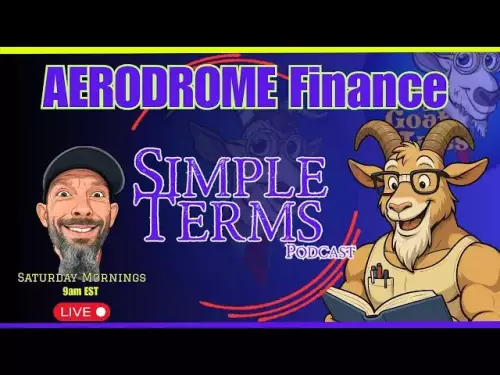-
 bitcoin
bitcoin $122288.232522 USD
0.16% -
 ethereum
ethereum $4480.662914 USD
-0.22% -
 xrp
xrp $2.962747 USD
-2.32% -
 tether
tether $1.000120 USD
-0.05% -
 bnb
bnb $1145.654223 USD
-2.07% -
 solana
solana $227.105217 USD
-1.67% -
 usd-coin
usd-coin $0.999548 USD
-0.02% -
 dogecoin
dogecoin $0.250875 USD
-2.04% -
 tron
tron $0.340654 USD
-0.49% -
 cardano
cardano $0.837968 USD
-2.52% -
 hyperliquid
hyperliquid $48.960449 USD
0.06% -
 chainlink
chainlink $22.049280 USD
-1.33% -
 ethena-usde
ethena-usde $1.000404 USD
0.02% -
 sui
sui $3.586212 USD
0.20% -
 avalanche
avalanche $29.894916 USD
-4.18%
How to operate Bybit option trading? What is the difference with contracts?
Bybit offers options trading with features like a user-friendly interface and high liquidity, helping traders manage risk and make informed decisions.
May 16, 2025 at 11:35 pm
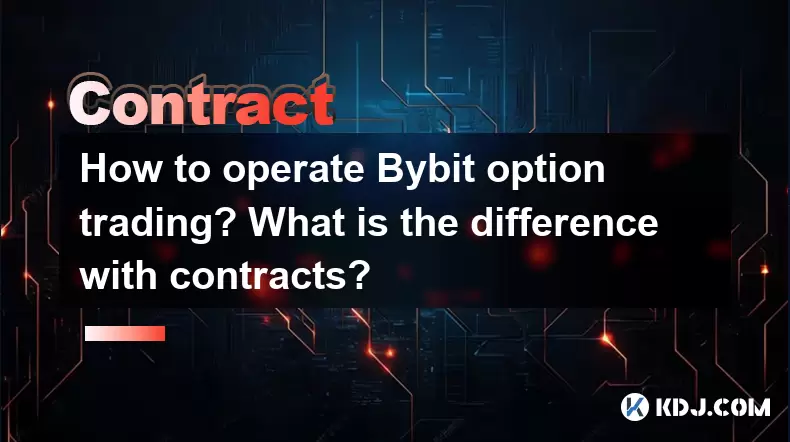
Bybit is a popular cryptocurrency exchange that offers a variety of trading options, including options trading and futures contracts. Understanding how to operate Bybit option trading and the differences between options and contracts can help traders make informed decisions. This article will guide you through the process of trading options on Bybit and explain the key differences between options and contracts.
Understanding Bybit Option Trading
Bybit option trading allows traders to buy or sell the right to purchase or sell an underlying asset at a predetermined price within a specific time frame. Options are financial derivatives that can be used for hedging, speculation, or income generation. Bybit offers both call options and put options, which give traders flexibility in their trading strategies.
To start trading options on Bybit, you need to have a verified account and sufficient funds in your wallet. Here's how you can begin:
- Log in to your Bybit account and navigate to the options trading section.
- Select the cryptocurrency you want to trade options on. Bybit offers options on various cryptocurrencies, such as Bitcoin (BTC) and Ethereum (ETH).
- Choose the expiration date for your option. Bybit offers options with different expiration dates, ranging from weekly to monthly.
- Decide on the strike price. The strike price is the price at which the option can be exercised. You can choose from a range of strike prices available on Bybit.
- Select the type of option. You can choose between a call option, which gives you the right to buy the underlying asset, or a put option, which gives you the right to sell the underlying asset.
- Enter the quantity of options you want to buy or sell. Bybit allows you to trade options in different sizes, depending on your trading strategy.
- Review your order and confirm the details. Once you are satisfied with your order, submit it to the Bybit platform.
Key Features of Bybit Option Trading
Bybit offers several features that make options trading more accessible and efficient for traders. Some of the key features include:
- User-friendly interface: Bybit's platform is designed to be intuitive and easy to navigate, making it suitable for both beginners and experienced traders.
- Liquidity: Bybit ensures high liquidity in its options market, which helps traders execute their orders quickly and at favorable prices.
- Risk management tools: Bybit provides various risk management tools, such as stop-loss orders and take-profit orders, to help traders manage their positions effectively.
- Educational resources: Bybit offers a range of educational resources, including tutorials and guides, to help traders understand options trading and develop their strategies.
Differences Between Options and Contracts
While both options and contracts are financial derivatives, there are several key differences between them. Understanding these differences is crucial for traders to choose the right instrument for their trading needs.
- Rights vs. Obligations: Options give the buyer the right, but not the obligation, to buy or sell the underlying asset. In contrast, futures contracts impose an obligation on both the buyer and the seller to fulfill the contract at the expiration date. This means that with options, you have more flexibility and control over your position.
- Premium vs. Margin: When trading options, you pay a premium to buy the option, which is the cost of the right to buy or sell the underlying asset. With futures contracts, you need to deposit a margin, which is a portion of the contract value, to open a position. The premium for options is typically lower than the margin required for futures contracts, making options more accessible for traders with limited capital.
- Risk and Reward: Options trading can offer limited risk and unlimited reward for buyers. The maximum loss for an option buyer is the premium paid, while the potential profit is unlimited if the market moves in their favor. On the other hand, futures contracts can result in unlimited risk and reward for both buyers and sellers, as the potential losses and gains are directly tied to the price movement of the underlying asset.
- Expiration and Settlement: Options have a fixed expiration date, after which they become worthless if not exercised. Futures contracts also have an expiration date, but they are typically settled in cash or through physical delivery of the underlying asset. Bybit offers cash-settled futures contracts, which means that the profit or loss is settled in the form of cryptocurrency.
How to Manage Bybit Option Positions
Managing your option positions effectively is crucial for maximizing your trading success. Here are some strategies you can use to manage your Bybit option positions:
- Monitor the market: Keep an eye on the price movements of the underlying asset and the overall market conditions. This will help you make informed decisions about when to exercise your options or close your positions.
- Use stop-loss orders: Bybit allows you to set stop-loss orders to automatically close your option positions if the market moves against you. This can help limit your losses and protect your capital.
- Adjust your positions: As the market conditions change, you may need to adjust your option positions to adapt to the new environment. This can involve rolling over your options to a different expiration date or strike price, or closing your positions and opening new ones.
- Diversify your portfolio: To reduce your risk, consider diversifying your option positions across different cryptocurrencies and expiration dates. This can help you spread your risk and increase your chances of success.
Tips for Successful Bybit Option Trading
To increase your chances of success in Bybit option trading, consider the following tips:
- Educate yourself: Take the time to learn about options trading and the specific features of Bybit's platform. Bybit offers a range of educational resources that can help you improve your knowledge and skills.
- Start small: If you are new to options trading, start with small positions to gain experience and build your confidence. As you become more comfortable with the market, you can gradually increase your position sizes.
- Develop a trading plan: Before you start trading, develop a clear trading plan that outlines your goals, risk tolerance, and strategies. Stick to your plan and avoid making impulsive decisions based on emotions.
- Use risk management techniques: Always use risk management techniques, such as stop-loss orders and position sizing, to protect your capital and minimize your losses. Bybit's platform offers various tools to help you manage your risk effectively.
Frequently Asked Questions
Q: Can I trade options on Bybit with leverage?A: Bybit does not offer leverage for options trading. When you buy an option, you pay the premium upfront, and your potential loss is limited to the premium paid. However, Bybit does offer leverage for futures contracts, which can amplify both your potential profits and losses.
Q: How can I calculate the potential profit and loss of an option trade on Bybit?A: To calculate the potential profit and loss of an option trade, you need to consider the premium paid, the strike price, and the price of the underlying asset at expiration. For a call option, your potential profit is unlimited if the price of the underlying asset rises above the strike price, while your potential loss is limited to the premium paid. For a put option, your potential profit is the difference between the strike price and the price of the underlying asset at expiration, minus the premium paid, while your potential loss is limited to the premium paid. Bybit's platform provides tools to help you calculate these values.
Q: What happens if I do not exercise my option before the expiration date on Bybit?A: If you do not exercise your option before the expiration date, it will expire worthless, and you will lose the premium you paid to buy the option. Bybit will automatically close your option position at expiration, and any remaining funds will be returned to your wallet.
Q: Can I sell an option before the expiration date on Bybit?A: Yes, you can sell an option before the expiration date on Bybit. This is known as closing your position. To sell an option, navigate to the options trading section, select the option you want to sell, and enter the quantity you want to sell. Bybit will match your order with a buyer, and the transaction will be executed at the current market price.
Disclaimer:info@kdj.com
The information provided is not trading advice. kdj.com does not assume any responsibility for any investments made based on the information provided in this article. Cryptocurrencies are highly volatile and it is highly recommended that you invest with caution after thorough research!
If you believe that the content used on this website infringes your copyright, please contact us immediately (info@kdj.com) and we will delete it promptly.
- BlockDAG, DOGE, HYPE Sponsorship: Crypto Trends Shaping 2025
- 2025-10-01 00:25:13
- Deutsche Börse and Circle: A StableCoin Adoption Powerhouse in Europe
- 2025-10-01 00:25:13
- BlockDAG's Presale Buzz: Is It the Crypto to Watch in October 2025?
- 2025-10-01 00:30:13
- Bitcoin, Crypto, and IQ: When Genius Meets Digital Gold?
- 2025-10-01 00:30:13
- Stablecoins, American Innovation, and Wallet Tokens: The Next Frontier
- 2025-10-01 00:35:12
- NBU, Coins, and Crypto in Ukraine: A New Yorker's Take
- 2025-10-01 00:45:14
Related knowledge
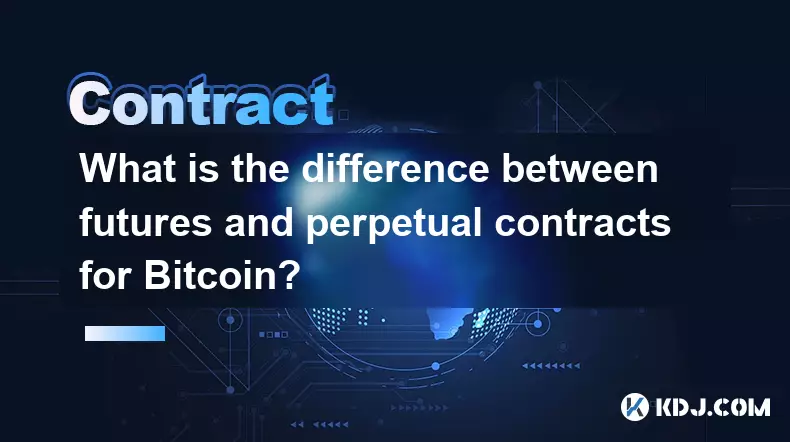
What is the difference between futures and perpetual contracts for Bitcoin?
Oct 02,2025 at 11:54pm
Understanding Bitcoin Futures Contracts1. Bitcoin futures are derivative instruments that allow traders to speculate on the future price of Bitcoin at...
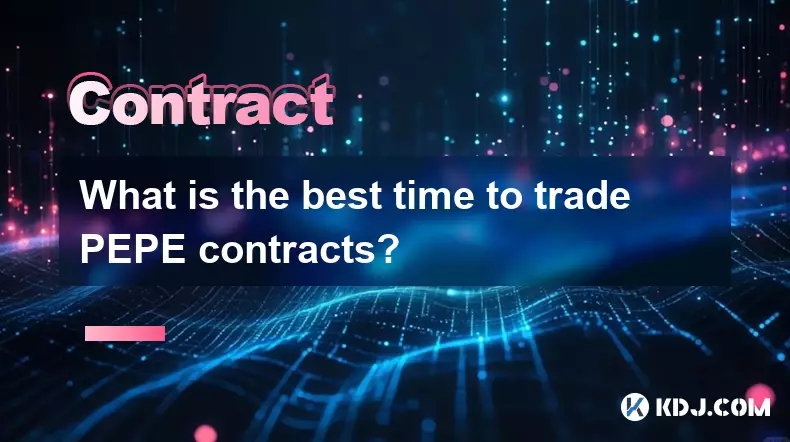
What is the best time to trade PEPE contracts?
Oct 03,2025 at 11:54am
Understanding PEPE Contract Volatility1. PEPE contracts exhibit extreme price fluctuations due to their meme-based nature and low market cap. Trading ...
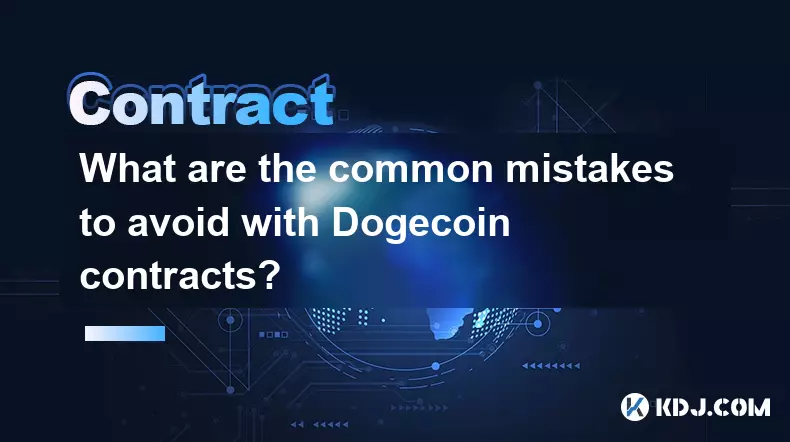
What are the common mistakes to avoid with Bitcoincoin contracts?
Oct 03,2025 at 08:54am
Emerging Trends in the Cryptocurrency Market1. Decentralized finance (DeFi) platforms continue to expand their influence across the blockchain ecosyst...

What is the maintenance margin for Bitcoin contracts?
Oct 02,2025 at 01:36am
Decentralized Exchanges Gain Momentum in 20241. Decentralized exchanges (DEXs) have seen a significant rise in trading volume, surpassing centralized ...

How to use technical analysis for trading XRP contracts?
Oct 03,2025 at 01:18pm
Understanding Price Patterns in XRP Futures1. Identifying chart patterns such as triangles, head and shoulders, and double tops or bottoms can provide...

What does "longing" PEPE contracts mean?
Oct 03,2025 at 11:54pm
Understanding Decentralized Exchanges in the Crypto Ecosystem1. Decentralized exchanges (DEXs) operate without a central authority, allowing users to ...

What is the difference between futures and perpetual contracts for Bitcoin?
Oct 02,2025 at 11:54pm
Understanding Bitcoin Futures Contracts1. Bitcoin futures are derivative instruments that allow traders to speculate on the future price of Bitcoin at...

What is the best time to trade PEPE contracts?
Oct 03,2025 at 11:54am
Understanding PEPE Contract Volatility1. PEPE contracts exhibit extreme price fluctuations due to their meme-based nature and low market cap. Trading ...

What are the common mistakes to avoid with Bitcoincoin contracts?
Oct 03,2025 at 08:54am
Emerging Trends in the Cryptocurrency Market1. Decentralized finance (DeFi) platforms continue to expand their influence across the blockchain ecosyst...

What is the maintenance margin for Bitcoin contracts?
Oct 02,2025 at 01:36am
Decentralized Exchanges Gain Momentum in 20241. Decentralized exchanges (DEXs) have seen a significant rise in trading volume, surpassing centralized ...

How to use technical analysis for trading XRP contracts?
Oct 03,2025 at 01:18pm
Understanding Price Patterns in XRP Futures1. Identifying chart patterns such as triangles, head and shoulders, and double tops or bottoms can provide...

What does "longing" PEPE contracts mean?
Oct 03,2025 at 11:54pm
Understanding Decentralized Exchanges in the Crypto Ecosystem1. Decentralized exchanges (DEXs) operate without a central authority, allowing users to ...
See all articles





















